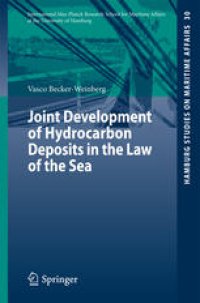
Ebook: Joint Development of Hydrocarbon Deposits in the Law of the Sea
Author: Vasco Becker-Weinberg (auth.)
- Tags: Law of the Sea Air and Outer Space, International Environmental Law, Dispute Resolution Mediation Arbitration, Fossil Fuels (incl. Carbon Capture), Environmental Law/Policy/Ecojustice
- Series: Hamburg Studies on Maritime Affairs 30
- Year: 2014
- Publisher: Springer-Verlag Berlin Heidelberg
- Edition: 1
- Language: English
- pdf
This book examines the concept and purpose of joint development agreements of offshore hydrocarbon deposits from the perspective of public international law and the law of the sea, taking into consideration and extensively reviewing State practice concerning seabed activities in disputed maritime areas and when hydrocarbon deposits extend across maritime boundaries. It distinguishes between agreements signed before and after the delimitation of maritime boundaries and analyzes the relevance of natural resources or unitization clauses included in maritime delimitation agreements. It also takes into consideration the relation between these resources and maritime delimitation and analyzes all the relevant international jurisprudence. Another innovative aspect of this book is that it examines the possibility of joint development of resources that lay between the continental shelf and the Area, considering both theoretical and practical problems. As such, the book is a useful tool for scholars and experts on public international law and the law of the sea, but also for national authorities and practitioners of international disputes resolution, as well as public and private entities working in the oil and gas industry.
This book examines the concept and purpose of joint development agreements of offshore hydrocarbon deposits from the perspective of public international law and the law of the sea, taking into consideration and extensively reviewing State practice concerning seabed activities in disputed maritime areas and when hydrocarbon deposits extend across maritime boundaries. It distinguishes between agreements signed before and after the delimitation of maritime boundaries and analyzes the relevance of natural resources or unitization clauses included in maritime delimitation agreements. It also takes into consideration the relation between these resources and maritime delimitation and analyzes all the relevant international jurisprudence. Another innovative aspect of this book is that it examines the possibility of joint development of resources that lay between the continental shelf and the Area, considering both theoretical and practical problems. As such, the book is a useful tool for scholars and experts on public international law and the law of the sea, but also for national authorities and practitioners of international disputes resolution, as well as public and private entities working in the oil and gas industry.